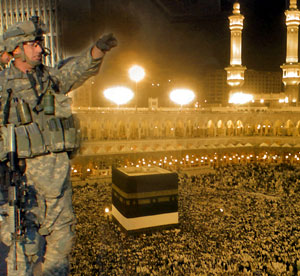- Neo-con extremists push internment for American Muslims (FCN, 02-18-2005)
- The “War on Terror” Exposed (FCN/Minister Farrakhan, 05-03-2004)

WASHINGTON (FinalCall.com) – The global war on terror has become a thinly veiled excuse to wage a global war on Islam with increased arrests of Muslims, calls for regime change in Muslim countries and racial profiling, according to a leader with a national Islamic organization.
“The tactic of terrorism–and yes it is a tactic, not an ideology–has been deployed by a multitude of groups of different religions, ethnicities and ideologies and yet the Islamic faith, unlike any other, is erroneously and incessantly associated with terrorism,” said Dr. Parvez Ahmed, a national board member of the Council on American Islamic Relations. “The association of a faith practiced by 1.2 billion people worldwide to terrorism creates the perception that the GWOT is a war against Islam.”
Around the world since 2001 there have been increases in the arrest and detention of Muslims.
Dr. Ahmed explained that right after 9/11 World Trade Center attacks, the federal government subjected 80,000 Arab and Muslim immigrants to fingerprinting and registration, sought out 8,000 Arab and Muslim men for FBI interviews and imprisoned over 5,000 foreign nationals in anti-terrorism preventive detention compounds.
“These arrests and detentions did not result in the conviction of a single person for a terrorist crime. Thus the U.S. government’s record for the largest ethnic profiling campaign stood at 0 for 93,000,” he said.
According to researchers in Paris, nearly 60 to 70 percent of all inmates are Muslim even though they only make up about 12 percent of the population. The Open Society Institute found that in the Netherlands 20 percent of adult prisoners and 26 percent of all juvenile offenders are Muslim while the country is only 5.5 percent Islamic.
In Belgium, researchers found Muslims from Morocco and Turkey make up at least 16 percent of the prison population, though just two percent of the general population. In the United Kingdom, 11 percent of prisoners are Muslim, though Muslims are only 3 percent of the population.
“The Secret Services are stretched to capacity just in monitoring Muslims,” said Hillary Muhammad, student minister of Muhammad Mosque No. 1 in London. “Islam is the fastest growing religion in Europe. It’s like a fad here. Everyone young wants to be Muslim. When people are arrested they go in one way but they come out Muslims,” he said.
“Jail is becoming the breeding ground for Islam especially for Black and Asian teens. People migrate from war torn countries like Eritrea and Sudan as asylum seekers. The young members of the family share Islamic philosophy. They are converting people to Islam right and left.”
Frank Cillufro, vice president of the Homeland Security Policy Institute at George Washington University told the media May 6 at the National Press Club that America has to recalibrate her response to terrorism.
“We can’t kill and capture our way to victory. We can’t arrest away the problem. The solutions to this problem must come from within. I want to see more Islamic scholars be a part of the solution. They have to show how extremists are taking the dialogue out of context.
“America has to win the hearts and minds of the people,” he said. “Why are the vast majority of people killed Muslim?”
While the media has the world focused on Muslim countries, according to research, other groups commit the vast majority of worldwide terrorist acts.
“Between 1980 and 2003, the Liberation Tigers of Tamil Eelan, a group that recruits from the predominantly Hindu Tamil population in Sri Lanka and whose ideology is intertwined with Marxism, was the world’s leader in suicide terrorism. Despite this, Islamic groups receive the most attention in the Western media,” said Dr. Ahmed.
“Suicide bombings are the product of modern political violence. Suicide bombings by Muslims are not the result of any Islamic ideology, but rather they are the result of the sociopolitical conditions of occupations (such as Palestine, Chechnya and Iraq) and the outcome of proxy wars fought in Afghanistan, where America not only armed the mujihadeen, but also enabled a culture of drugs and violence,” he said.
Dr. Ahmed also noted that terrorism is a word generally applied to “one’s enemies or those with whom one disagrees.”
“Hence the decision to call someone or label some organization ‘terrorist’ becomes almost unavoidably subjective, depending largely on whether one sympathizes with or opposes the person/group/cause concerned,” he said.
“If one identifies with the victim of the violence, for example, then the act is terrorism. If, however, one identifies with the perpetrator, the violent act is regarded in a more sympathetic, if not positive (or worst, an ambivalent) light; and is not terrorism,” Dr. Ahmed said.
“In all aspects of this war we need a position of humility noting our own actions of the past,” said Dr. Douglas Johnston, of the International Center for Religion and Diplomacy.
“They (violent groups) are using scripture out of context. Religious legitimacy trumps everything. The answer to bad theology is good theology.
“One person, one vote was the last thing on people’s minds in Iraq. They wanted the ability to practice their religion. We missed the bet by not having religious leaders at the table. They’re deemed as being absolutists and not willing to negotiate. We have to deal with the religious leaders. They are the moral authority. They have to feel ownership because they have unrivaled influence at the grassroots level.”












